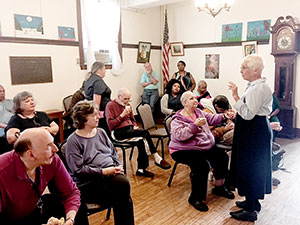
Sen. Jehlen visited the Somerville Home in September.
(The opinions and views expressed in the commentaries and letters to the Editor of The Somerville Times belong solely to the authors and do not reflect the views or opinions of The Somerville Times, its staff or publishers)
By Senator Patricia D. Jehlen
The Massachusetts population – like all of us – is getting. Already there are more people over 60 than under 20.
At the same time, we’re losing institutions that care for people who need help, and we’re not developing the workforce to provide care.
After 120 years, the Somerville Home will close in December. It’s a rest home, which provides more care than assisted living but not skilled nursing like a nursing home.
Rest homes
The closing of the Somerville Home is not the fault of the staff or the board. It is certainly not the fault of the 47 residents. Some of them have lived there for decades; some moved there when other rest homes closed; some were previously homeless.
The Home’s problem is that the state, which pays for almost all the residents, hasn’t raised its rates since 2012. All of the Home’s costs have gone up but their income hasn’t.
Since 2008, 24 rest homes have closed; out of 147 rest homes in 1998, 53 remain. One that closed recently is now a doggy day care.
Because of low state payments, rest homes often can’t access loans to upgrade their facilities and attract private pay residents who would pay higher rates.
Residents who are displaced from rest homes often find no other such home, and wind up in nursing homes which offer less independence and cost a lot more. Already five Somerville Home residents are moving to nursing homes.
I recently visited the home, and was really moved to hear some of the residents talk about how important their relationships with each other and the staff are, and how disturbed they are to have to move, perhaps far away from family and the community they know.
Adult day health
We aren’t just losing rest homes. Last November, the Windsor House adult day health program at Sancta Maria in Cambridge closed, displacing 47 people.
Adult day health programs provide care during the day, allowing many people to live at home. 23 programs have closed since the last rate increase in 2012. Frozen rates don’t cover the cost of new requirements, or increases in health insurance premiums, earned sick time, minimum wages, and other costs of living. Many staff qualify for MassHealth.
While nonprofit, high quality services close, some new, for-profit services have opened, but they care for private pay people.15-20% of those who are displaced when an adult day health closes enter nursing homes within 6 months; even if they find a new program, the disruption causes them to decompensate. Moving to nursing homes costs the state millions of additional dollars a year.
Nursing homes
Nursing homes are also at risk. Sancta Maria Nursing Facility in Cambridge was also scheduled to close in December, but in September announced a reprieve after hiring a new management company.
At least 11 other nursing homes have announced their closure this year. Again, the closures are generally non-profit, high quality nursing facilities; they are being replaced by for-profit, multi-state, lower-quality homes, as reported by Kay Lazar in several Globe articles. Lazar found that for-profit nursing homes spend less on food and nursing care.
Most nursing home residents are paid for by Medicaid, which reimburses $37 per day below the cost of patient care, according to Mass. Senior Care.
The Senate has twice adopted my provision in the budget requiring CHIA to study costs in nursing homes: we need to understand why some nursing homes can’t make it, while others are bought by investors who expect to make a profit. That would be a first step to creating a requirement, as we have in health insurance, that a certain percentage of income go to patient care. Unfortunately, the provision didn’t survive conference committee.
Of course it’s not just payments that has caused reductions in nursing home beds. More people, both publicly and privately paid, are receiving home care. There are more assisted living residences, though only a few – like the ones run by the Visiting Nurses in Somerville – are affordable for most people. But low rates to agencies, and low pay for workers, are creating a crisis in home care as well.
We won’t get what we don’t pay for
Each of these programs – the Somerville Home, Windsor House/Sancta Maria, and the Sancta Maria Nursing Home – was/is at risk because they primarily serve people who are paid by the state, which has not increased its inadequate rates, although I and other legislators advocate for increases every year. Each was running at a loss. Each is representative of many other programs for older people which are closing while the number of older people is rising.
When corporations, agencies and nonprofits hire executives, they justify high pay in order to attract the best. But when rest homes, or nursing homes, or adult day health programs, or other social service programs seek just to catch up with the cost of living, or to pay their workers a living wage, state officials say we can’t afford it.
Do we need more revenue? That’s a major question in the governor’s race. Gov. Baker says we don’t. The income tax will probably go down again in January if revenues continue high enough to hit the “trigger.”
I don’t think we can continue to squeeze agencies and direct care workers. What do you think?












The only way to fix this is to Vote. These facilities covered dual eligible patients, meaning that these are patients who are covered by both medicare and medicaid. If you want to change what is going on you need to get out and vote to strengthen both of these programs. (BTW these are some of the ‘entitlements’ that the current administration wants to cut)
It’s an absolute disgrace. With all the things we throw money at there needs to a review of our priorities. This should not be happening.
No one can change how this will work out in the end. A dog and pony show by the DPH and many concerned citizens testifying, and Somerville Hospital (CHA) was still allowed to close their detox unit in the midst of an opioid epidemic.